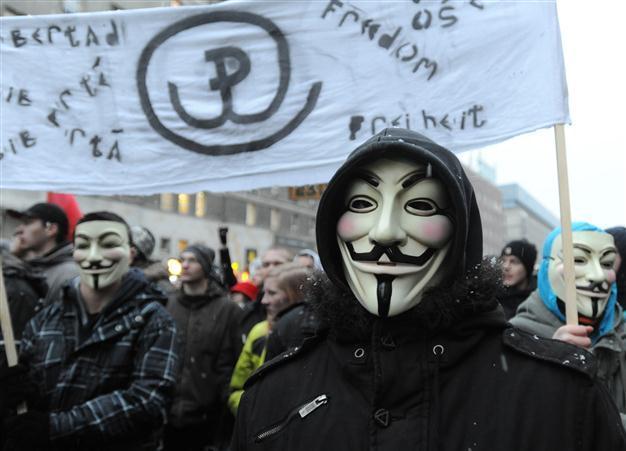Poland signs copyright treaty that drew protests
WARSAW - The Associated Press

Internet activists wearing masks protest against the international copyright agreement ACTA , the Anti-Counterfeiting Trade Agreement, in front of the European Parliament office in Warsaw, Poland, Tuesday, Jan. 24, 2012. AP photo
Poland on Thursday signed an international copyright agreement which has sparked days of protests by Internet users who fear it will lead to online censorship.
Poland's ambassador to Japan, Jadwiga Rodowicz-Czechowska, signed the Anti-Counterfeiting Trade Agreement, or
ACTA, in Tokyo, she told the all-news station TVN24.
Later in the day, hundreds of people took to the streets of the eastern city of
Lublin to express their anger over the treaty.
ACTA is a far-reaching agreement that aims to harmonize international standards on protecting the rights of those who produce music, movies, pharmaceuticals, fashion, and a range of other products that often fall victim to intellectual property theft.
It shares some similarities with the hotly debated Stop Online Piracy Act in the U.S., which was shelved by lawmakers last week after Wikipedia and Google blacked out or partially obscured their websites for a day in protest.
Poland was one of several European Union countries to sign ACTA Thursday, but it appeared to be the only place where support for the agreement has caused outrage and protests by Internet activists.
Rodowicz-Czechowska said other countries that signed included Finland, France, Ireland, Italy, Portugal, Romania and Greece.
Several other industrialized countries, including the
United States,
Canada and South Korea, signed the agreement last year.
Poland's support for ACTA has sparked attacks on Polish government websites by a group calling itself "Anonymous" that left them unreachable for days, as well as street protests in several Polish cities.
ACTA aims to fight the online piracy of movies and music, and those opposed to it fear that it will also lead authorities to block content on the Internet. Critics also say governments have negotiated the agreement in secret and failed to consult with their societies along the way.
Thousands of people took to the streets in past days across Poland to voice their outrage over ACTA. Some taped their mouths shut in a sign that they fear their online freedom of expression will be hampered by it.
In reaction to the widespread opposition, Polish leaders have been struggling to allay fears over it.
Poland's Foreign Minister Radek Sikorski defended his government's position in a TV interview Wednesday evening, arguing that ACTA is not as threatening as young people fear.
But he said the Internet should not be allowed to become a space of "legal anarchy." "We believe that theft on a massive scale of intellectual property is not a good thing," Sikorski said.
